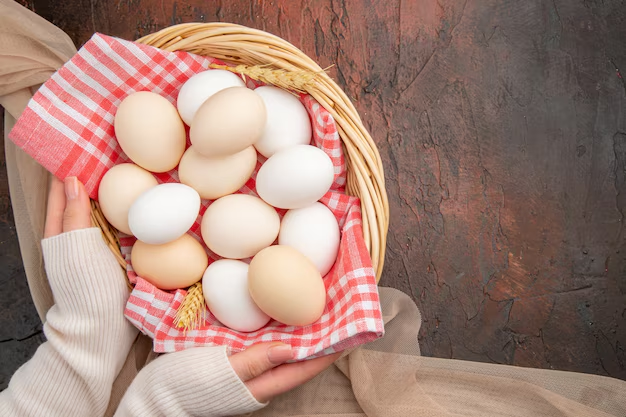How Fresh Are Your Eggs? Discover How Long They Can Last in the Refrigerator
Eggs are a staple in kitchens around the world, prized for their versatility and nutritional value. But as common as they are, there's one lingering question that often perplexes us: How long do eggs actually last in the refrigerator? This is more than just a trivia question; it's a crucial concern that affects food safety and reduces waste. In this guide, we'll unpack everything you need to know about the shelf life of eggs, ensuring that your meals are both delicious and safe.
Understanding Egg Freshness: The Basics
What Affects Egg Freshness?
Understanding how long eggs last begins with recognizing the factors that influence their freshness:
- Storage Conditions: How and where you store eggs directly impacts their shelf life. Refrigerated eggs last longer than those kept at room temperature.
- Eggshell Quality: The condition of the eggshell plays a critical role. Thick and unbroken shells help protect the egg from bacteria.
- Handling: Eggs that are handled less frequently and stored properly in their carton are more likely to stay fresh longer.
Why Refrigeration Matters
Refrigeration significantly extends the life of eggs. In many parts of the world, especially in the U.S., eggs are washed and sanitized before reaching the store. This process removes the natural protective coating, or "bloom," prompting the need for refrigeration. Once in a cold environment, bacterial growth slows, preserving the egg's quality over time.
How Long Can Eggs Last in Your Fridge?
The Average Shelf Life
Once refrigerated, eggs can last beyond their sell-by or expiration dates when stored correctly:
- Fresh Eggs: Typically last 3-5 weeks in the refrigerator. Some sources mention they remain wholesome even slightly beyond this period under optimal conditions.
- Hard-Boiled Eggs: Ideal consumption within 1 week, even when stored in the fridge, as the cooking process removes their protective outer layer.
Recognizing Freshness and Quality
To determine an egg's freshness, consider the following methods:
- Float Test: Place an egg in a bowl of water. Fresh eggs sink while older ones float due to increased air inside the shell.
- Sniff Test: A foul odor is a definitive sign that the egg has gone bad.
- Visual Check: Inside the egg, look for black spots or significant discoloration, indicators that it’s time to discard.
Storing Eggs Properly: Best Practices
Optimal Storage Solutions
For maximizing egg freshness, follow these storage tips:
- Keep Them Cool: Always store eggs in their original carton in the coldest part of the refrigerator, not on the door where temperatures fluctuate.
- Away from Pungent Foods: Eggs can absorb odors, so keep them away from strong-smelling foods.
The Role of Egg Cartons
Egg cartons are designed to protect from impacts and also slow the loss of moisture and carbon dioxide, which helps maintain quality. Make sure to keep eggs in their original packaging whenever possible.
Beyond Freshness: Understanding Egg Dates
Decoding Egg Carton Dates
Egg cartons often have multiple dates printed on them. Here's how to interpret them:
- Sell-By Date: While not a safety date, it tells stores when to stop selling the eggs.
- Expiration (EXP) Date: Indicates the end of the optimal consumption period.
- Julian Date: A three-digit code representing the day of the year the eggs were packed.
Tips for Reducing Egg Waste 🥚
Practical Insights
To prevent wasting eggs while ensuring you're always using fresh ones, consider these strategies:
- Buy Smaller Quantities: If household egg consumption is low, purchase smaller quantities more frequently.
- Rotation Practice: Use the older eggs first by placing new cartons behind older ones in the fridge.
- Utilize Leftovers: Use older eggs for recipes where eggs are fully cooked, reducing the chance of spoilage.
Food Preservation Techniques
If you find yourself with a surplus, solutions include:
- Freezing Eggs: Crack and lightly beat eggs before freezing them in airtight containers.
- Pickling: Hard-boiled eggs can be pickled for long-term preservation.
Common Concerns and Misconceptions
Misunderstood Concepts
Many people harbor concerns and misconceptions about egg storage:
- Refrigerating in the Door: Although convenient, eggs should be kept deeper inside the fridge where temperatures are more stable.
- Raw Egg Safety: As long as you follow proper storage guidelines, the risk of contamination is minimized.
Safety vs. Consumption Quality
While eggs might not spoil after a few weeks, their texture and culinary quality might decline. Understanding this distinction helps in making informed choices on when to consume them for best results.
Quick Reference: Egg Storage Tips & Lifespan 🥚
Here's a handy bullet-point guide to keep your eggs fresh and reduce waste:
- 🥶 Refrigerate eggs in their original carton.
- 📆 Use older eggs sooner; practice first-in, first-out in your fridge.
- 🤿 Use the float test to check egg freshness.
- 🍳 Consumed hard-boiled eggs within a week.
- ❌ Discard eggs with unusual odors or appearances.
- ❄️ Consider freezing if you have an abundance.
Wrapping Up
Eggs are a convenient, nutritious food embraced by many—not just for breakfast but across all meals. The key to enjoying them safely and deliciously is understanding the nuances of their storage and longevity. By following the guidelines in this article, you can maximize the shelf life of your eggs, reduce waste, and ensure every omelet, meringue, or sunny-side-up egg is enjoyed at its best quality. The world of food storage may be complex, but a few simple practices go a long way in keeping your eggs fresh and your meals delightful.

